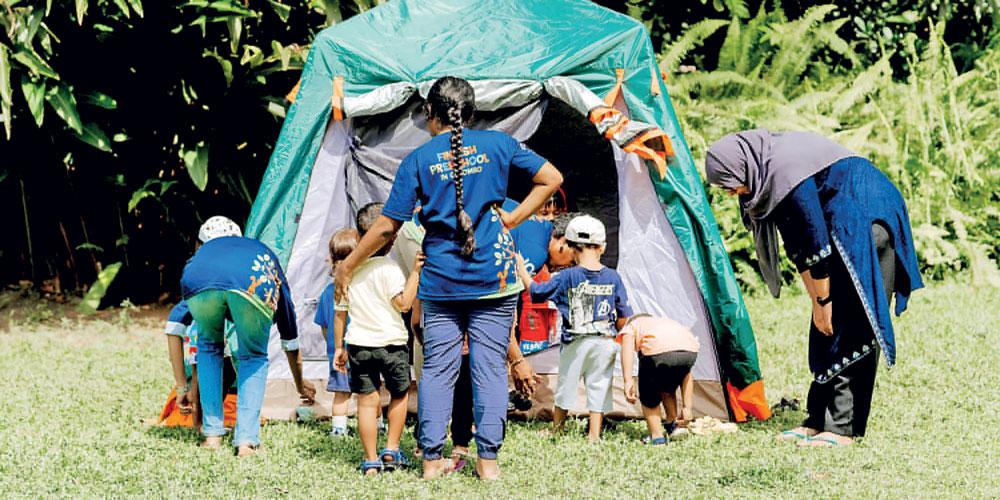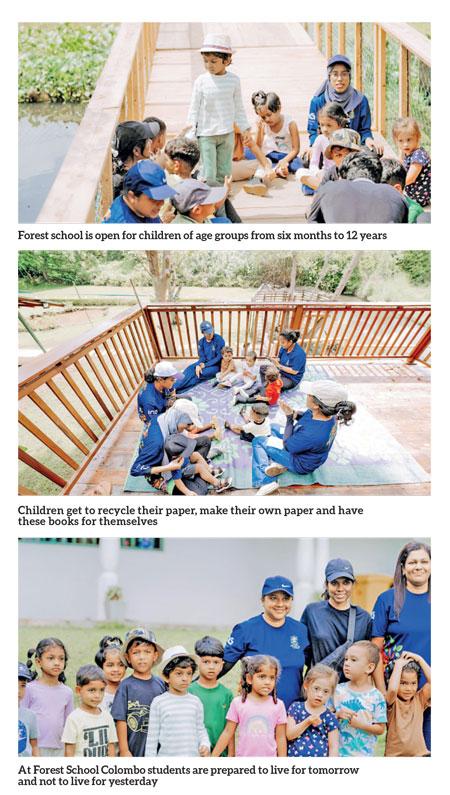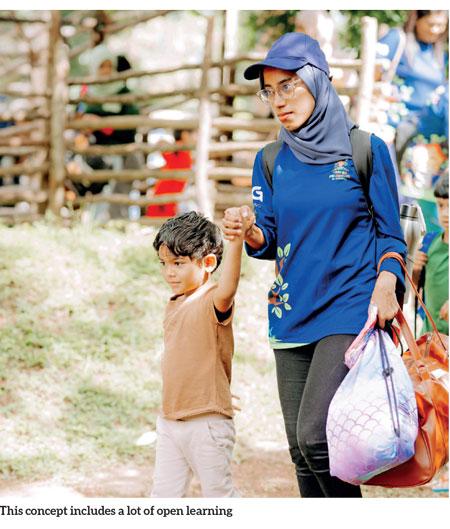Reply To:
Name - Reply Comment

Children at forest school get the opportunity to engage in various activities such as making natural tea from hibiscus flowers to making furniture, building shelters, engaging in nature journaling and so on
While they learn, it’s not the teachers who facilitate the learning, but rather the environment and the children themselves. They decide, they understand what needs to be done and follow the existentialism philosophy as well”
- Aymen Razvy, Academic coordinator at Forest School Colombo
 South Asia’s First Forest School recently opened its doors to the public, ushering in a novel educational experience for children. Located in Piliyandala, Sri Lanka, overlooking the pristine Bolgoda Lake, Forest School Colombo is a pioneering educational initiative that introduces the concept of nature-based learning for children.
South Asia’s First Forest School recently opened its doors to the public, ushering in a novel educational experience for children. Located in Piliyandala, Sri Lanka, overlooking the pristine Bolgoda Lake, Forest School Colombo is a pioneering educational initiative that introduces the concept of nature-based learning for children.
A classroom called the environment
This one-of-a-kind educational initiative is the brainchild of Yasmin Mubarak who carries over 16 years of experience in early childhood education and training. He has therefore taken time and effort to curate a diverse learning experience for children. At Forest School Colombo, nature is the teacher and the environment is the classroom.
“The forest school concept is where children learn at the heart of nature,” said Aymen Razvy, Academic coordinator at Forest School Colombo. “While they learn, it’s not the teachers who facilitate the learning, but rather the environment and the children themselves. They decide, they understand what needs to be done and follow the existentialism philosophy as well. They are motivated to ask questions, formulate their opinions and discover themselves. The Forest school ethos is about a child growing as a child without any external suppression to diminish creativity. So, they blossom as their own being,” said Razvy.
Alternative experience
 The Forest school concept originates from Scandinavian countries which emphasises on the benefits of outdoor activities and fostering holistic growth by connecting children with nature. This connection is often lost within the traditional educational system that many countries follow. Therefore, the Forest school concept is now becoming popular in countries such as Australia and UK as well.
The Forest school concept originates from Scandinavian countries which emphasises on the benefits of outdoor activities and fostering holistic growth by connecting children with nature. This connection is often lost within the traditional educational system that many countries follow. Therefore, the Forest school concept is now becoming popular in countries such as Australia and UK as well.
“This is an alternative education system as opposed to the traditional system,” Razvy continued. “The Forest school is affiliated to the Forest School Association UK and we follow the Finnish model of learning which includes holistic development in learning. Children learn through play and through being themselves. Teachers are called facilitators because they facilitate the learning process by providing a safe environment, creating an inclusive social circle with children and providing resources etc. Facilitators ensure that the learning happens in an efficient manner,” she continued.
A day at Forest School Colombo
Activities – When a child walks into the forest school he or she gets to engage in a lot of day-to-day activities from gardening to looking after animals, feeding and grooming animals, participating in cleanups and so on. As such children are vested with a responsibility of taking care of the environment at a young age. Parents also don’t need to worry about a booklist because there’s no booklist per se. Instead, children start to learn and develop everything they learn from scratch.
“They get to recycle their paper, make their own paper and have these books for themselves,” Razvy added. “They write on stones and various other natural materials and by doing so we believe that they would start to appreciate nature. When children participate in a forest school setup they learn resilience, practice patience, develop empathy, learn to care for the vulnerable, are more careful with nature, learn teamwork skills and practice discipline because they know that if they don’t follow the rules the consequences are severe. Their safety would be compromised. Therefore they have to walk and behave in a certain way. As such this concept includes a lot of open learning. They go through a lot of risks as opposed to being kept safe in an enclosed environment,” she added.
Curated courses
Forest school is open for children of age groups from six months to 12 years. From infant courses to play dates, forest camps and many other programmes Forest School Colombo delivers a diverse learning experience that prepares children to live in the future. Another factor that helps children to stay focused is its pristine location. Here, children have the luxury of not being confined to concrete walls. “The Bolgoda Lake is the largest freshwater ecosystem in the country and it has a great biodiversity. There are purple faced langurs, endangered and endemic flora and fauna which make it a perfect spot for children to experience nature at its best because many of it remains untouched,” added Razvy.
Even though Forest School Colombo is affiliated with foreign educational institutions, the team had localised these courses with Sri Lanka’s rich biodiversity. “There’s a lot we could add to the courses and we are still in the process of developing our curriculum. We have various activities such as making natural tea from hibiscus flowers to making furniture, building shelters, using various tools, outdoor skills training, ecological explorations, nature journaling, adventure challenges and so on. All these courses have been designed to allow children’s imaginations to run wild, allowing them to think critically while enjoying the outdoors.
An invitation for parents
Making a difference within a decades-old education system may sometimes be a challenge, but Razvy says that the feedback they had received had been positive and overwhelming. “Quite surprisingly, parents have been happy to send their children to the Forest School for a different learning experience. But for parents who still have doubts, it is quite normal that they don’t want to take a leap of faith and do trials with their children. The exams-based, assessment-based way of assessing children had been happening for a long period of time and some parents still think that it is the only way for children to learn. But on a positive note, we now see a big shift among the vast majority of the public. At Forest School Colombo we are preparing our children to live for tomorrow and not to live for yesterday. Our education system was setup during the industrial era where people eventually worked in factories. But today, these factories are closing but the education system remains. The world is getting digitalised and we need to prepare our children to manage the future. So it’s high time that we all take a leap of faith and prepare our children for the future rather than keeping them confined to a dying educational system,” Razvy said while inviting everybody to pay a visit to their school, meet with the team and catch a glimpse of what they have to offer to children.
(For more details visit www.forestschoolcolombo.com)